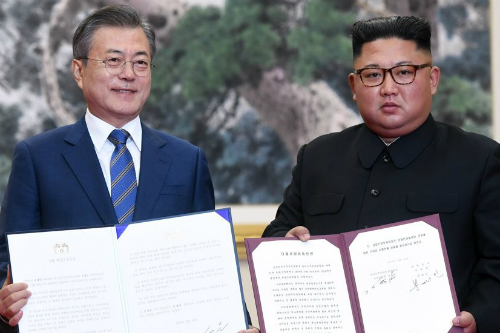Pyongyang Declaration takes effect as controversy continues
By Choi He-sukPublished : Oct. 29, 2018 - 11:37
The Pyongyang Declaration was posted on the official government gazette Monday, promulgating the declaration and bringing the agreement to effect. The main opposition Liberty Korea Party, meanwhile, immediately filed for an injunction to suspend the agreement taking effect, claiming that the government has violated the Constitution.
The Pyongyang Declaration, announced during President Moon Jae-in’s visit to Pyongyang last month, calls for an end to military hostilities and improved inter-Korean relations and cooperation.
The declaration also states that the two sides will cooperate in resolving issues regarding families separated by the Korean War, and in denuclearizing the Korean Peninsula.

The declaration was approved by the Cabinet and Moon on Oct. 23, with the administration deeming parliament ratification unnecessary for the declaration.
While legal procedures required to bring the Pyongyang agreement reached between Moon and North Korean leader Kim Jong-un have been completed, political wrangling over the matter continues.
The main opposition Liberty Korea Party criticized the ratification, claiming that the government had violated the Constitution in forgoing the parliamentary ratification process.
Cheong Wa Dae rebutted opposition parties’ claims, saying that the declaration does not require parliamentary approval, as it is not a treaty with another country according to the South Korean Constitution.
The Constitution does not recognize North Korea as a sovereign nation and defines the territory of South Korea as the Korean Peninsula and associated islands.
The relations between the two Koreas are defined by the South’s Development of Inter-Korean Relations Act not as that of two countries, but as “special relations established temporarily in the course of pursuing unification.”
Citing the Development of Inter-Korean Relations Act, the presidential office also stated that as the Pyongyang Declaration does not entail measures placing significant financial burden on the South, parliamentary approval was unnecessary.
Under the Development of Inter-Korean Relations Act, parliamentary ratification for an inter-Korean agreement is only required when significant financial burden will be placed on the South, or when legislation is required.
Cheong Wa Dae’s interpretation of the related laws has done little to appease the opposition, however.
“Improving inter-Korean relations is all good, but important matters involving significant input of state funds require parliamentary approval,” Liberty Korea Party floor leader Rep. Kim Sung-tae said at a meeting of floor leaders on Monday. Comparing Moon’s method of running state affairs to that of an “imperial majesty,” Kim accused the government of ignoring legal procedures and oppressing the opposition bloc.
Rep. Joo Kwang-deok of the same party earlier took issue with the promulgation of the declaration, claiming that the declaration cannot be a subject to promulgation.
According to Joo, the Act on the Promulgation of Statutes limits subjects of promulgation to treaties and laws.
Joo also claimed that for the Pyongyang Declaration to be processed in a manner similar to laws and treaties, it must be subjected to parliamentary ratification process or that the Act on the Promulgation of Statutes must be revised.
By Choi He-suk (cheesuk@heraldcorp.com)



![[Exclusive] Korean military set to ban iPhones over 'security' concerns](http://res.heraldm.com/phpwas/restmb_idxmake.php?idx=644&simg=/content/image/2024/04/23/20240423050599_0.jpg&u=20240423183955)

![[Graphic News] 77% of young Koreans still financially dependent](http://res.heraldm.com/phpwas/restmb_idxmake.php?idx=644&simg=/content/image/2024/04/22/20240422050762_0.gif&u=)



![[Pressure points] Leggings in public: Fashion statement or social faux pas?](http://res.heraldm.com/phpwas/restmb_idxmake.php?idx=644&simg=/content/image/2024/04/23/20240423050669_0.jpg&u=)










